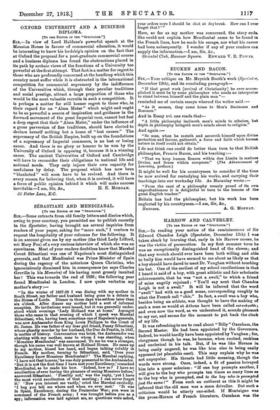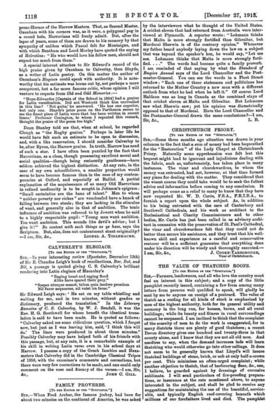HARROW AND CALVERLEY.
[To THE EDITOR OF THE " SPECTATOR."1 SrE,—In reading your notice of the reminiscences of Sir Edward Chandos Leigh (Spectator, December 13th) I was taken aback by learning that, early in his Harrow career, he was the victim of persecution. In my first summer term he was an exceptionally distinguished head of the eleven; and that any wretch should ever have been both willing and able to bully him would have seemed to me about as likely as that a boy should have dared to meet Dr. Vaughan without touching his hat. One of the earliest of my school recollections is that I heard it said of a boy, with great athletic and fair scholastic achievements, that he was "not a swell," to which a friend of mine angrily rejoined : "You'll say next that Chandos Leigh is not a swell." It will be inferred that the word "swell" had with us a good sense, corresponding roughly to what the French call "chic." In fact, a swell was a boy who, besides being an athlete, was thought to have the making of such a man as would at Athens have been called KasoKleya0Jr; and even now the word, as we understood it, sounds pleasant to my ear, and seems for the moment to put back the clock of my life. It was refreshing to me to read about "Billy" Oxenham, the Second Master. He had been appointed by the Governors. Indeed, he would hardly have been appointed by Vaughan ; for, clergyman though he was, he became, when excited, reckless and unclerieal in his talk. But, if he was like Horace in being easily angered, he was like him also in being easily appeased (ut placabilis esset). This may explain why he was not unpopular. His threats had little meaning, though the words were strong. Once, indeed, a fit of passion betrayed him into a queer solecism : "If one boy prompts another, I will give to the boy who prompts ten times as many lines as to the boy who is prompted, and to the boy who is prompted just the same !" From such an outburst as this it might be inferred that the old man was a mere driveller. But such a criticism would be utterly one-sided. If Montaigne was the prose-Horace of French literature, Oxenham was the
prose-Horace of the Harrow Masters. That, as Second Master, Oxenhain with his corners was, as it were, a polygonal peg in a round hole, Harrovians will freely admit. But, after the lapse of years, some of them are drawn to his memory by that sympathy of unlikes which Pascal felt for Montaigne, and with which Bentham and Lord Morley have quoted the saying of Helvetius "He who would love his fellow men, should not expect too much from them."
A special interest attaches to Sir Edward's record of the high praise given by Oxenham to Calverley, then Blayds, as a writer of Latin poetry. On this matter the author of Oxenham's Elegiacs could speak with authority. It is note- worthy that his estimate was borne out by, not perhaps a more competent, but a far more famous critic, whose opinion I will venture to requote from Old and Odd Memories :—
" Hope-Edwardes [Captain of the School in 1854] had a genius for Latin versification. Did not Westcott think him unrivalled in this line? 'Not quite,' he answered. 'He has one superior, but only one. Blayds's prize poem on the Parthenon seems to me the finest piece of Latin verse that has been written in recent times.' Professor Conington, to whom I repeated this remark, thought the praise of the poem too high."
Dean Stanley told me that, when at school, he regarded Clough as "the Rugby genius." Perhaps in later life he would have felt such an estimate to be open to discussion, and, with a like reservation, I should consider Calverley to be, after Byron, the Harrow genius. In truth, Harrow has need of such a star. I have often been puzzled by the fact that Harrovians, as a class, though possessing excellent moral and social qualities—though being eminently gentlemen—have seldom achiec-ed the highest distinction. At any rate, in the case of my own schoolfellows, a smaller proportion would seem to have become famous than in the case of my contem- poraries at Oxford, and especially at Balliol. A partial explanation of the acquiescence of so many Old Harrovians in refined mediocrity is to be sought in Johnson's epigram : "Small certainties are the bane of talent." Men to whom "neither poverty nor riches" are vouchsafed have a knack of falling between two stools ; they are lacking in the stimulus of want, and generally also in that of ambition. The tonic influence of ambition was referred to by Jowett when he said to a highly respectable pupil : "Young men want ambition. You want ambition. This sounds like devil's advice ; but I give it!" Be content with such things as ye have, says the Scripture. But, alas, does not contentment stunt originality?



































 Previous page
Previous page